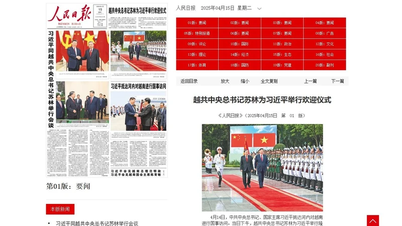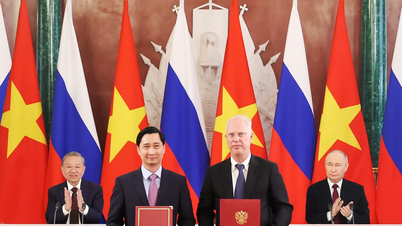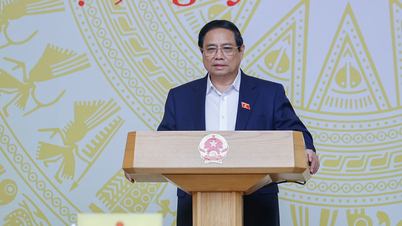To be able to do journalism on a digital platform, good content is not enough, it must be digital content. That is, highly personalized content, so that every audience, listener, and reader can find themselves in it.
 |
| Journalist Dong Manh Hung believes that in order to do journalism on a digital platform, the most important thing for each press agency is still good content. |
That is the opinion of journalist Dong Manh Hung, Head of the Editorial Secretariat of Voice of Vietnam Radio in an interview with The Gioi and Viet Nam Newspaper on the occasion of Vietnam Revolutionary Press Day, June 21.
Journalism finds solutions in difficult times
How do you evaluate the current economic situation of journalism?
It can be said that the press economy is a relatively complicated issue, related to the functions and tasks of the press. Recently, the Covid-19 epidemic has strongly impacted the socio-economy in general, including press agencies. Despite great efforts to have additional revenue for production, many press agencies still face many difficulties.
It is a fact that print newspapers, electronic newspapers, radio and television still rely heavily on advertising revenue. When the "health" of the business is in trouble, revenue will certainly be affected.
According to the Press Department, while in the past, advertising revenue always accounted for over 60%, even 90% for some press agencies, it has now seriously declined, especially for print newspapers. Other sources of revenue from ordering, production links, and production cooperation have also decreased sharply.
Some TV and radio stations have had to close channels or switch to editing and rebroadcasting content to make up for content contracts that have not been renewed. Of course, in difficult times, many press agencies are still trying to find their own solutions, but basically there is still a lot of pressure.
What is the cause of this situation, according to you?
There are many reasons for this. First of all, the advertising budget of businesses is shifting from mainstream press agencies to digital platforms and social networks. In 2022, while advertising on digital platforms increased by 22%, traditional advertising such as television and radio decreased by 4%.
Another problem is that the budget for press development investment accounts for less than 0.3% of the total state budget investment. In reality, not many governing bodies allocate budgets and resources to order or support press agencies in carrying out political, informational and propaganda tasks.
Of course, the reason is also that some press agencies are not really proactive in finding sources of revenue, support, and funding, and have not yet implemented digital transformation to create revenue on digital platforms.
Many people wonder whether we should equate journalism and autonomy?
In fact, these are two different concepts but are related to each other. Autonomous press agencies must conduct press economics, but not all press agencies that conduct press economics must be autonomous. Therefore, it is necessary to clearly define the mechanism of autonomy in the press to avoid misunderstandings or abuse of the "autonomous mechanism" to achieve different economic goals.
Currently, due to the autonomous mechanism, many newsrooms assign economic media quotas to reporters, leading to pressure on jobs and income, making writers susceptible to failure. Sometimes, reporters aim for economic contracts rather than focusing on the quality of their articles.
Another phenomenon arising from the abuse of the autonomy mechanism is the situation where reporters of some industry newspapers, especially electronic magazines, "break the rules" to write articles against negativity or PR for businesses, but in reality, it is to threaten and extort money, demand advertising or media contracts for personal gain or to submit them to the unit under the name of "supporting the editorial office".
Need to separate propaganda and business functions
Currently, each press agency still carries out a dual mission. That is, to carry out political tasks according to the newspaper's principles and purposes, along with doing business, even doing business to survive. How can a newspaper have a solid position, create a good foundation in the information flow, and still ensure the economic mission of journalism?
This is a difficult task. According to the Press Law, press agencies are not allowed to advertise in political news programs, and some propaganda content does not easily attract advertising. Therefore, these tasks must be funded by the State.
Press agencies will be autonomous and find their own sources of income in specialized pages and time slots for soft news, social life information, and entertainment. Here, it is also necessary to clearly identify the main national press agencies, radio and television channels, and local political newspapers that must be invested in and have budgets to operate. As for additional channels and newspapers that are not assigned to their duties, they must find sources of income to operate, but under any circumstances, press agencies must not deviate from their principles and purposes.
In our opinion, to develop a press economy, it is necessary to clearly separate the propaganda function and the business function of the press, as well as clearly define the press agencies that perform propaganda functions and political tasks.
From there, there are policies to support and order press agencies to serve political tasks and essential information, giving priority to supporting key press agencies, press agencies with great influence, operating effectively, contributing to building a strong media complex with widespread influence and influence in society.
As for other press agencies that do not perform propaganda functions, regulations must be completed so that these press agencies can operate as businesses.
 |
| Producing digital content is completely different from producing content on traditional platforms. (Illustration: Internet) |
In order for press agencies to be able to do business sustainably and long-term, what is the solution here, according to you?
In addition to the awareness and responsibility of writers and the strict management of functional press agencies, a legal framework is needed to implement these issues. The 2016 Press Law has specific regulations, creating a legal corridor for the development of the press economy, specifically in Article 21 "Types of activities and sources of revenue of press agencies"; Article 37 "Associations in press activities".
However, these regulations are still incomplete and not specific, leading to confusion in press agencies' operations, and on the other hand, creating conditions for some press agencies and journalists to take advantage of them to violate the regulations.
In addition, considering magazines as businesses will lead to difficulties in controlling and directing propaganda content. If they are not businesses, then what model do magazines operate under? This is a crucial issue in correcting the situation of "newspaperization" of magazines, "newspaperization" of general electronic information sites, "newspaperization" of social networks of the press in general in recent times.
Also from the autonomous mechanism, many ways have arisen to help the press do business, including association and socialization. Association and socialization in press activities in general and radio activities in particular aim to mobilize resources from outside organizations and units to participate in the process of producing press products.
Thereby, helping central and local press agencies reduce funding sources, increase resources in terms of materials, means and human resources in the production process. This is very necessary and has helped press agencies have more resources to increase production capacity and have quality press products.
However, currently, the Press Law does not clearly regulate production association and production cooperation activities, so it is necessary to have strict regulations on these activities in the press law.
Article 37 of the 2016 Press Law only regulates cooperation in press activities, and has no regulations on business and service activities of press agencies. Clause 1 of Article 37 “Cooperation in press activities” stipulates that “Press agencies are allowed to cooperate in press activities with other press agencies, legal entities, and individuals with business registrations appropriate to the field of cooperation as prescribed by law”.
| "Not all press products that are published verbatim on digital platforms are considered digital content." |
If only association with legal entities and individuals with business registration is allowed, this limits the scope of association of press agencies, especially in the fields of advertising, program production, and press product production as prescribed in Points b, c, d and dd, Clause 1 of this Article.
The provisions in clauses 3, 4, 5, 6, Article 37 of the Press Law 2016 on association in press activities stipulate the responsibility of press agencies in association in general, without specific regulations on the form (joint venture contract or business cooperation contract...), without specific regulations on the order, procedures as well as the legal corridor that must be followed when conducting association. There are no specific regulations on the conditions, capacity, and commitments required of the association partner, leading to the phenomenon of enterprises forcing the press to produce according to their content or intervening too deeply in the production stage, even in the censorship stage...
When there are clear and specific regulations, it will ensure objectivity and direction in press production when there is a connection.
Good content is not enough, it must be digital content
Nowadays, readers’ needs have gradually shifted from paper newspapers to digital versions. So, what should press agencies do to exploit revenue from the digital environment?
The press today is facing fierce competition from all forms of media on digital platforms. This competition comes from both content and public sharing.
The public needs to access information in many ways, in many flexible ways, suitable for each individual's approach to information. At that time, digital platforms clearly showed their advantages compared to traditional forms of journalism such as radio and television.
| "In the press economy, if we consider press products as commodities, we must consider audiences and readers as customers. Serving customers with the products they need, not the products we have, is the top principle of the market economy." |
With just a smartphone, the public can satisfy all their needs, from receiving information, socializing, entertaining and fulfilling personal needs, they no longer need to look to traditional information providers such as newspapers.
Therefore, digital transformation is the top priority of press agencies today, in the context of fierce competition with other types of media on digital platforms.
It is undeniable that the digital environment, through digital content systems, value-added services on telecommunications networks, reader-fee services with specialized and attractive content... is attracting advertising revenue.
To do business on a digital platform, press agencies must have good, attractive content that is suitable for the public. Currently, some press agencies in our country have initially implemented content charging such as VietnamPlus e-newspaper, VietnamNet, Nguoi Lao Dong, Tuoi Tre Newspaper ... However, everything is just at the beginning, there is no assessment of the effectiveness of this activity.
In addition, investing in funding and human resources for digital transformation is also an issue that press agencies must pay attention to. Press agencies must have appropriate technology and solutions, especially human resources in both technology and content production. To be able to do journalism on a digital platform, the most important thing for each press agency is still good content.
However, there is a problem that digital content production is completely different from content production on traditional platforms. Good content is not enough, it must be digital content, to suit the digital environment, that is, highly personalized content, content that every audience, listener, and reader can find themselves in.
As mentioned above, in the press economy, if we consider press products as commodities, we must consider audiences and readers as customers. Serving customers with the products they need, not the products we have, is the top principle of the market economy.
Here, there is an issue I want to emphasize, which is that just because we put the original press products on the digital platform, it is not considered digital content. Digital press products need to be edited, staged, even completely rewritten to suit the digital public, those who need to exploit information in many ways, with many flexible ways, suitable for each individual's approach to information.
Another fundamental point is that the current Press Law does not recognize specific digital products as a press genre. Therefore, it is necessary to supplement, adjust and amend the Press Law, at the same time, supplement technical and economic norms for creative activities and content production in the digital environment, creating a legal corridor for the development of digital content to be favorable.
Thank you!
Source


![[Photo] National Assembly Chairman works with leaders of Can Tho city, Hau Giang and Soc Trang provinces](https://vphoto.vietnam.vn/thumb/1200x675/vietnam/resource/IMAGE/2025/5/11/c40b0aead4bd43c8ba1f48d2de40720e)

![[Photo] Discover the beautiful scenery of Wulingyuan in Zhangjiajie, China](https://vphoto.vietnam.vn/thumb/1200x675/vietnam/resource/IMAGE/2025/5/11/1207318fb0b0467fb0f5ea4869da5517)

![[Photo] The moment Harry Kane lifted the Bundesliga trophy for the first time](https://vphoto.vietnam.vn/thumb/1200x675/vietnam/resource/IMAGE/2025/5/11/68e4a433c079457b9e84dd4b9fa694fe)
![[Photo] Prime Minister Pham Minh Chinh chairs the fourth meeting of the Steering Committee for Eliminating Temporary and Dilapidated Houses](https://vphoto.vietnam.vn/thumb/1200x675/vietnam/resource/IMAGE/2025/5/11/e64c18fd03984747ba213053c9bf5c5a)

























































































Comment (0)